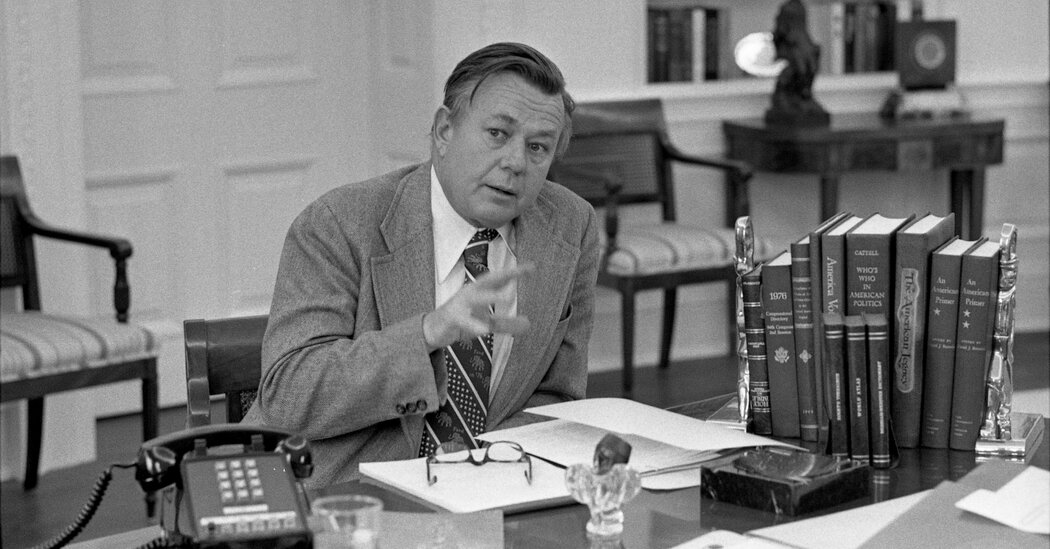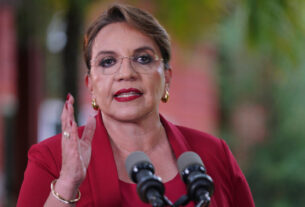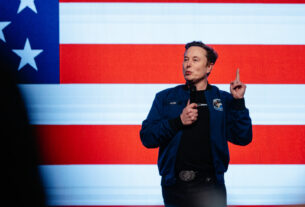Stuart K. Spencer, who as one of the nation’s first political consultants for hire took a so-called B-list actor named Ronald Reagan and helped him become governor of California and later president of the United States, died on Sunday at his home in Palm Desert, Calif. He was 97.
His wife, Barbara Spencer, confirmed his death. “He was vibrant up to the last six months of his life or less, and then time caught him,” she said.
Mr. Spencer worked for many of the leading Republicans of his time, including President Gerald R. Ford and Gov. Nelson A. Rockefeller of New York, but he was most remembered as one of the prime architects of Mr. Reagan’s unlikely rise from Hollywood to the White House.
Where others saw in Mr. Reagan a lightweight right-winger, Mr. Spencer deemed him a political natural who articulated strong principles and connected with voters across the partisan fence. “Ronald Reagan was extremely articulate, the most articulate maybe that America has ever seen,” he wrote in a self-published memoir in 2013.
A gruff, profane chain-smoker who once used an expletive in the Oval Office to tell President Ford that he was a poor campaigner, Mr. Spencer personified a rough-and-tumble era of politics before the advent of cable television and social media. Politics was a serious business, he believed, but it could also be rollicking fun, and he relished telling war stories.
In the memoir, “Behind the Podium: My Fifty Years in Politics,” he described once encountering Elizabeth Taylor at a political gathering (“she was completely hammered”); another time, an angry campaign aide pulled a .45-caliber pistol on him (“he was talking crazy, waving the gun around”). He related stories about Frank Sinatra and Bob Guccione, the publisher of Penthouse magazine, and ruefully recalled turning down campaign money from a brothel owner in Louisiana.
But Mr. Spencer respected his opponents, a trait that is increasingly vanishing in modern politics. In his later years, he lamented the rise of President Donald J. Trump and what he called the disappearance of the Republican Party that he had spent his life building.
At his 90th-birthday party, Mr. Spencer bristled at any comparisons of Mr. Trump, then in his first term, to the Republican he had helped make president. “He is President Trump, not President Reagan,” he told a crowd of friends and admirers. Mr. Reagan, he said, “had class and a totally different belief system.”
Mr. Spencer and Bill Roberts founded the consulting firm Spencer-Roberts in 1960. They aided Republicans of all kinds, from liberals like Mr. Rockefeller and Senator Thomas H. Kuchel of California to conservatives like Mr. Reagan and, to Mr. Spencer’s chagrin, Representative John H. Rousselot of California, an officer in the hard-right John Birch Society.
Their work for Mr. Rockefeller in the 1964 presidential race, when he almost won the California primary against Senator Barry Goldwater, led to the Reagan connection. When Mr. Reagan, who had campaigned for Mr. Goldwater, sought advice on running for governor of California in 1966, Mr. Goldwater recommended the team that had given him so much trouble.
Mr. Reagan went on to challenge Edmund G. (Pat) Brown Sr., the political veteran and two-term Democratic governor, but one problem that Spencer-Roberts faced was Mr. Reagan’s lack of political experience.
Their solution was to coin the label “citizen-politician” for the former actor. They used the term to argue that traditional politicians had messed up the state so badly that an outsider was needed. Pressing law-and-order issues at the time of the Watts riots in Los Angeles and tumultuous antiwar demonstrations, Mr. Reagan won in a landslide. And with Mr. Spencer running his 1970 campaign, he was easily re-elected.
Mr. Roberts retired in 1974, and when Mr. Reagan ran for president in 1976, Mr. Spencer was no longer on his side; he had fallen out with Reagan aides in the governor’s office and had become the chief strategist for President Ford, who was trying to fend off Mr. Reagan’s challenge for the Republican nomination.
Mr. Spencer knew Mr. Reagan’s strengths. “Even then,” he said in an interview for this obituary in 2012, “Reagan owned the heart of the Republican Party.” When the rest of Mr. Ford’s team thought an early string of successes would lead to a romp to the nomination, he warned that Mr. Reagan was a fighter. Indeed, Mr. Ford’s victory was sealed only at the party’s convention, in Kansas City, Mo.
But Mr. Spencer also knew Mr. Reagan’s weaknesses, like an inattention to detail, and he organized a damaging attack on a Reagan speech calling for $90 billion in federal budget cuts. He also concocted a searing television ad in which a voice warned, as a hand reached for a voting lever, “When you vote Tuesday, remember, Governor Ronald Reagan couldn’t start a war. President Ronald Reagan could.” Mr. Reagan was furious.
The ad, which Mr. Spencer cheerfully described in 2012 as a “hell of an accusation,” was shown only in California, where it backfired, but it was picked up nationally by newspapers and television and helped Mr. Ford win the crucial Ohio and New Jersey delegations.
Mr. Ford started the 1976 general election campaign 30 percentage points behind former Gov. Jimmy Carter of Georgia, his Democratic challenger. Mr. Spencer bluntly assessed Mr. Ford’s weakness. “You’re a lousy candidate,” he told the president, adding an earthy expletive. Mr. Ford agreed to a “Rose Garden strategy” in which he would remain at the White House, to look presidential, rather than stump across the nation. Mr. Ford closed the gap but lost narrowly to Mr. Carter.
Despite his work for Mr. Ford, Mr. Spencer was called back to Mr. Reagan’s side in September 1980, when Mr. Reagan stumbled at the beginning of the general election campaign for the presidency. Mr. Spencer traveled with Mr. Reagan as he steadied and finally trounced President Carter. Mr. Spencer was there again when Reagan was re-elected in 1984 in another landslide.
While Mr. Spencer refused to join the administration — “I love campaigning; I hate governing,” he would say — the president and the first lady, Nancy Reagan, often leaned on him. In his book, “President Reagan, the Role of a Lifetime,” Lou Cannon, Mr. Reagan’s leading biographer, called Mr. Spencer “the outside adviser the Reagans most readily consulted in times of crisis.”
His last important appearance on the national stage came in 1988, when he was enlisted to help Senator Dan Quayle of Indiana, the Republican vice-presidential candidate, whose first appearances after being chosen were awkward and stumbling. Mr. Quayle did better after Mr. Spencer arrived.
He was born Stuart Murphy in Phoenix on Feb. 20, 1927. His father, he recalled, had a drinking problem and “walked out of our family and out of my life.” When his mother, Beulah, married A. Kenneth Spencer, a dentist and prominent Republican in Orange County, Calif., he was renamed Stuart Krieg Spencer.
After graduating from high school in 1945, Stuart enlisted in the Navy. He earned a degree in 1951 from Los Angeles State College, now California State University, Los Angeles, and soon went to work as director of recreation for the city of Alhambra, Calif., from 1951 to 1959. In his spare time he did volunteer work for Republicans. He later joined the Los Angeles County Republican Committee, but quit in 1960 to form his consulting firm with Mr. Roberts.
Mr. Spencer’s first marriage, to Joan Dikeman, ended in divorce. He married Barbara Callihan in 1992. In addition to her, he is survived by two children from his first marriage, Steven Krieg Spencer and Karen Gwen Spencer; a stepdaughter, Debbie DeSilva; and six grandchildren.
Though Mr. Spencer retired in the 1990s, he continued to offer advice to Republicans for years, especially on winning over Hispanic voters. “They are family-oriented,” he said in the 2012 interview with The Times. “They are industrious people. They are small-business-community people. Their basic belief system is closer to being a Republican than it is a Democrat.”
But, he added, when Republicans “start talking about ‘shipping them back’ and ‘no amnesty’ and all that, that’s their cousin or their uncle.”
Mr. Spencer’s prized candidate was always Mr. Reagan; he took pride in having helped him reach the heights of power. But he remained humble about how much anyone’s advice really meant. As he reflected in an interview with The Times in early 2023, “He did way more for me than I ever did for him.”





